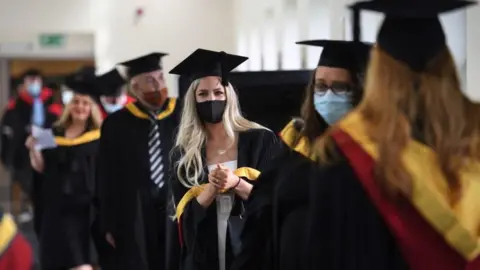Graduates in England facing tax rise by stealth, says IFS
 Getty Images
Getty ImagesGraduates in England face a "stealth" tax rise as the earnings threshold at which they start repaying student loans is to be frozen, researchers say.
The Institute for Fiscal Studies says a graduate earning £30,000 will now repay £113 more a year than expected.
The government said the freeze, coming into effect in April, would help maintain the stability of the student loan system.
The threshold increased in line with average earnings in previous years.
Higher education minister Michelle Donelan said in a written update on Friday: "It is now more crucial than ever that higher education is underpinned by just and sustainable finance and funding arrangements, and that the system provides value for money for all of society at a time of rising costs."
She added: "This government has already confirmed that we will freeze maximum tuition fee caps again for the 2022-23 academic year, the fifth year in succession that we have held fee caps at current levels."
The threshold is being kept at £27,295 per year, £2,274 a month, or £524 a week for 2022-23. Without the change, the threshold to start repaying loans would have risen by 4.6%.
Loan repayments for post-graduate students will also be frozen at £21,000 per year, £1,750 a month or £404 a week in 2022-23.
Ben Waltmann, senior research economist at independent research institute the IFS, said the decision "effectively constitutes a tax rise by stealth on graduates with middling earnings".
He said: "This will be a further hit to the real incomes of these graduates on top of the rising cost of living, the freeze in the personal allowance, and the hike in National Insurance rates."
Mr Waltmann added graduates with the lowest earnings do not reach the repayment threshold for student loans and will be unaffected by the freeze, while those with the highest earnings will find they will be repaying their loans quicker.
He said there would be a moderate impact on students if the freeze remained in place for a year, but if it was for longer than there would be "a much lower cost for the taxpayer and a much higher burden on graduates than they thought they had signed up for when they took out their loans".
Shadow universities minister Matt Western said there was a "cost of living crisis made in Downing Street" and that "whilst No 10 is in paralysis", Chancellor Rishi Sunak was raising taxes for millions of people.
Nick Hillman, director at the think tank, the Higher Education Policy Institute, said: "Few students or recent graduates will welcome this announcement but it is sensible because the current system has become out of kilter, with taxpayers paying much more than originally planned."
Consumer finance expert Martin Lewis said: "Whilst freezing sounds good, what it means in practice is everybody who is repaying will repay more each year and most people, the vast majority, will repay more towards their student loan in total."

- 'I CAN'T REMEMBER THE LAST TIME I DID SOME GOOD': Watch The Responder on BBC iPlayer
- FROM THE STREETS TO THE SCRIPT: How real-life experiences became a thrilling drama

